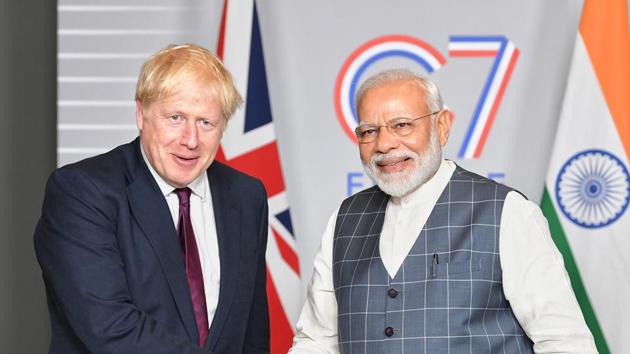India is right to bet on a post-Brexit UK
The invite to Boris Johnson indicates deepening strategic and economic convergence
India recently invited the United Kingdom (UK)’s Prime Minister Boris Johnson as chief guest for Republic Day 2021. Johnson, on Tuesday, officially accepted the invitation, and UK foreign secretary Dominic Raab’s ongoing visit to New Delhi is meant to set the agenda. The visit will take place less than a month after the UK leaves the European Union — with or without a deal. The timing and occasion of the visit signals intent on both sides to develop a genuine partnership.

For decades, India-UK relations remained suboptimal. This was because neither side was invested in truly understanding what the other valued. In India, London’s motivations were — incorrectly — viewed as a former colonial power’s desire to weigh in on regional issues such as Kashmir and the Afghan war by tilting towards Pakistan. This sense of grievance turned into disconnect when London scrapped the post-study work permit for international students. The move led to a sharp drop in Indian student numbers between 2013-17, even as Chinese student numbers swelled based on special visa arrangements. This trend is now reversing as the post-study work permit has been reintroduced.
The disconnect was apparent when the UK was pilloried in the Indian media for not countering China’s move to make Kashmir a formal agenda item at the United Nations Security Council (UNSC) after the effective nullification of Article 370. That London had shot down the proposal along with France, Russia, and the United States (US), was lost in translation.
In London, New Delhi’s lack of appreciation for the UK’s security concerns about troops in Afghanistan and radicalisation at home — both of which necessitate a security partnership with Pakistan — remained an irritant. India’s 2012 decision to purchase the French Dassault Rafale over the UK’s Eurofighter Typhoon fighter jet increased the estrangement.
In this context, Brexit became both a reason and an excuse to remain distant as high-level exchanges plummeted. London became busy in its domestic political turmoil and bureaucratic transitions. But whenever it did express interest to augment the relationship, New Delhi refused citing Brexit-related uncertainties.
Johnson’s visit offers an opportunity for a reset.
Though difficult to achieve in the short-term, both countries have an incentive to explore the viability of a Free Trade Agreement (FTA). For long, India has shied away given London’s emphasis on easy capital flows to and from India, which would hit Indian producers and retailers hard, without entertaining India’s reciprocal demand for liberal labour flows. In the face of a strong anti-immigrant public undercurrent (even if centered on migration from the EU), London has been cagey on the issue of labour flows. But, with their economies under stress due to the pandemic and bad policymaking, both sides are likely to revisit such conditions.
New Delhi’s decision to stay out of the Regional Comprehensive Economic Partnership (RCEP), and the ongoing farmers’ protest, will concentrate minds on how to better capitalise on British, and European, economic overtures. The economic contraction this year has raised strategic alarm in New Delhi, ie. India risks reduction in its global geopolitical weight due to reduced economic capabilities. Undoubtedly, FTAs with strategically aligned powers are not panacea for India’s ailing economy. But they offer an alternative as India seeks to reduce economic linkages with China.
In addition to economic incentives, London’s sharp downturn in relations with Beijing since the introduction of the draconian national security law in Hong Kong imparts strategic synergy to India-UK relations. The UK’s Integrated Review of Security, Defence, Development, and Foreign Policy 2021 has indicated that London must tilt towards the Indo-Pacific. The aim is to augment the UK’s presence in the Indian Ocean Region and work with powers such as India, Japan, and Australia, along with the EU and the US, to counter China.
To this effect, the India-UK Defence Logistics Pact will work as a lubricant in advancing dialogue on other issues. True, India has such pacts with other countries including France and the US, and it remains unclear under what conditions and to what extent India can militarily capitalise on British bases. But, given where these two countries stood just a few years ago, this is a step forward.
Collaboration in sectors such as digital technology, the climate crisis, and vaccine development will also see a fillip. India remains a top global exporter of raw materials for the pharmaceutical industry and will play an important role in the mass production of the Covid-19 vaccine. Under intense pressure to avoid another lockdown, having approved the Pfizer-BioNTech vaccine, and in agreement with India to develop the Oxford vaccine that is yet to be approved, Johnson has a critical interest in ensuring India’s partnership.
Finally, there has been a shift away from making this relationship hostage to the “Pakistan question”. In a show of political force — and perhaps interference — the Bharatiya Janata Party’s affiliates in the UK canvassed for Johnson in 2019 elections. By targeting the Jeremy Corbyn-led Labour Party as pro-Pakistan (given Corbyn’s criticism of India on Kashmir), these affiliates succeeded in swaying certain sections of the Indian diaspora away from Labour. It is no surprise that Keir Starmer, the new Labour leader, distanced himself from Corbyn’s position, and is working hard to reclaim Labour’s standing among the Indian diaspora.
There are miles to go before this partnership realises its true potential, but it is set to become “poll-proof” as India bets on a post-Brexit UK.



